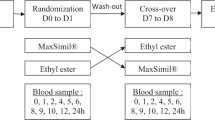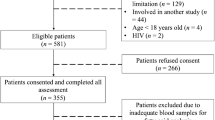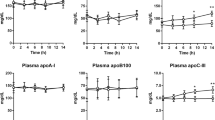Abstract
Objective: Deficiencies of essential fatty acids (EFA), vitamin A (retinol) and vitamin E (α- and γ-tocopherol) were studied in non-HPN patients with different degrees of fat malabsorption (managing without home parenteral nutrition (HPN)), and in HPN-patients receiving HPN with and without parenteral lipids.
Design and subjects: Phospholipid fatty acids (including EFA), cholesterol, retinol, α- and γ-tocopherol in plasma and the intestinal absorption of fatty acids and energy (balance-studies) were measured in 40 non-HPN patients, 44 HPN patients and 35 controls. Subgroups were non-HPN patients with fat:total energy absorption ratios >25% (A), between 15 and 25% (B), and <15% (C), and HPN patients receiving (D) and not receiving parenteral lipids (E).
Results: Intestinal absorption of the EFA linoleic acid was 8.2, 4.4, 3.8, 0.5 and 0.5 g/day and corresponding plasma concentrations were 17.3%, 15.5%, 13.1%, 12.1% and 8.9% in groups A–E, respectively (P<0.001). Deficiencies in EFA, defined as a Holman index >0.2 (20:3n-9/20:4n-6 ratio), were confined to 42% of the patients in group E. Plasma cholesterol was decreased in groups B–E. Plasma retinol was reduced (below the lower 2.5% confidence interval of controls) in 7% of non-HPN patients and in 20% of HPN patients. Plasma α-tocopherol was reduced in 64% of patients from groups B–E. Plasma γ-tocopherol was decreased in 33% of the patients, except in HPN-patients receiving parenteral lipids.
Conclusions: Plasma linoleic acid may decrease considerably (from 26% to 8–10%) as fat absorption decreases before secondary signs of essential fatty acid deficiencies occur (an increase in 20:3n-9 and the Holman index). In this study this was confined to patients on lipid-free HPN. Vitamin A deficiencies were mainly seen in HPN patients. Vitamin E deficiencies were common in both HPN and non-HPN patients, but administration of parenteral lipids normalized plasma γ-tocopherol.
Sponsorship: The study was sponsored by Rigshospitalet.
European Journal of Clinical Nutrition (2000) 54, 632–642.
This is a preview of subscription content, access via your institution
Access options
Subscribe to this journal
Receive 12 print issues and online access
$259.00 per year
only $21.58 per issue
Buy this article
- Purchase on Springer Link
- Instant access to full article PDF
Prices may be subject to local taxes which are calculated during checkout
Similar content being viewed by others
Author information
Authors and Affiliations
Contributions
Guarantor: PB Jeppesen.
Contributors: All the investigators contributed to the study design. PBJ initiated and supervised the clinical part of the study, collected the data and drafted the manuscript. All authors were involved in the revision of the manuscript.
Corresponding author
Rights and permissions
About this article
Cite this article
Jeppesen, P., Høy, CE. & Mortensen, P. Deficiencies of essential fatty acids, vitamin A and E and changes in plasma lipoproteins in patients with reduced fat absorption or intestinal failure. Eur J Clin Nutr 54, 632–642 (2000). https://doi.org/10.1038/sj.ejcn.1601067
Received:
Revised:
Accepted:
Published:
Issue Date:
DOI: https://doi.org/10.1038/sj.ejcn.1601067



